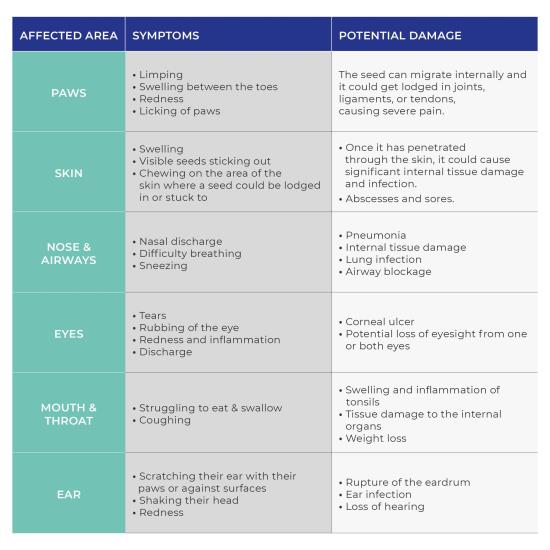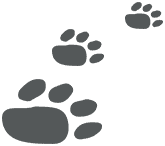Grass seeds are a common problem during the spring and summer months. While your pet explores the outdoors, grass seeds can easily brush off the tops of long grass stems onto their bodies. The seeds have pointed ends and are exceptionally sharp, so they become trapped in your pet’s fur and due to their barbed/arrow shape they can only travel in one direction. This means they can often penetrate skin or move into ears and cannot work their way back out.
If left untreated, grass seeds can cause a variety of problems. These problems range across the spectrum from minor irritation to conditions that require surgery. Grass seeds carry bacteria which can cause an infection or abscess where they penetrate the skin.
An untreated infection may spread, or the seed can cause severe internal damage as it travels through the body. Unfortunately, if the seed breaches the skin, surgery is often required to find the grass seed, along with the use of antibiotics and sometimes antifungals for treatment.
Symptoms
You pet could experience different symptoms depending on what part of the body is affected. Look out for swelling (especially between the toes), hair matting and irritation. Additional signs can include scratching, head shaking or discharge from the eyes or nose or potentially coughing if a grass seed is inhaled. You should be suspicious if any signs occur directly after a walk (sudden onset coughing, head shaking, closed / streaming eye). The table below provides more detail on the main symptoms and potential damage caused by grass seeds. The damage really depends on how far they travel and how long they are left.

Also look out for the sudden onset of a severe cough and seek veterinary advice if it occurs.
Prevention is the best cure
Try to keep your pet away from long grassy areas since the seeds can catch onto their coat, skin or toes very easily. If you take your pet outdoors for a walk, check their fur for any grass seeds when you get home. The typical areas to check are eyes, ears, nose, armpits and their toes – which is where the seeds often get lodged. Keep long-haired dogs trimmed or clipped and well-groomed, especially around their feet and ears.
If you are concerned that your pet may have picked up a grass seed please get in touch. The earlier grass seeds are caught, the less damage they can do.





